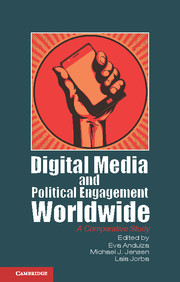Book contents
- Frontmatter
- Contents
- List of Tables and Figures
- Contributors
- Acknowledgments
- Introduction
- 1 The Impact of Digital Media on Citizenship from a Global Perspective
- 2 Recent Shifts in the Relationship between the Internet and Democratic Engagement in Britain and the United States
- 3 Political Engagement and the Internet in the 2008 U.S. Presidential Elections
- 4 Online Political Participation in the United States and Spain
- 5 Internet Use and Political Attitudes in Europe
- 6 Digital Media and Offline Political Participation in Spain
- 7 Online Participation in Italy
- 8 On the Causal Nature of the Relationship between Internet Access and Political Engagement
- 9 The Uses of Digital Media for Contentious Politics in Latin America
- 10 Opening Closed Regimes
- 11 Digital Media and Political Attitudes in China
- Conclusion
- References
- Index
10 - Opening Closed Regimes
Civil Society, Information Infrastructure, and Political Islam
Published online by Cambridge University Press: 05 July 2012
- Frontmatter
- Contents
- List of Tables and Figures
- Contributors
- Acknowledgments
- Introduction
- 1 The Impact of Digital Media on Citizenship from a Global Perspective
- 2 Recent Shifts in the Relationship between the Internet and Democratic Engagement in Britain and the United States
- 3 Political Engagement and the Internet in the 2008 U.S. Presidential Elections
- 4 Online Political Participation in the United States and Spain
- 5 Internet Use and Political Attitudes in Europe
- 6 Digital Media and Offline Political Participation in Spain
- 7 Online Participation in Italy
- 8 On the Causal Nature of the Relationship between Internet Access and Political Engagement
- 9 The Uses of Digital Media for Contentious Politics in Latin America
- 10 Opening Closed Regimes
- 11 Digital Media and Political Attitudes in China
- Conclusion
- References
- Index
Summary
Introduction
As Converse (1987, S14) once said of public opinion research, “a sample design which extracts unrelated individuals from the whole and assigns the opinion of each an equal weight is a travesty on any ‘realistic’ understanding of what the concept of public opinion means.” Today, any realistic understanding of public opinion formation in Muslim media systems must come from a critical awareness of the limits to survey data but also from an appreciation that digital information technologies are providing new opportunity structures for inclusion in the process of public opinion formation and measurement.
Ruling elites often try to co-opt civil society groups, and in times of political or military crises they can attempt to control the national information infrastructure. But a defining feature of civil society is independence from the authority of the state, even in countries such as Saudi Arabia and Egypt. And in important ways, digital communication networks are also independent of any particular state authority. What has been the impact of digital media on political communication in Muslim media systems? How have tools such as mobile phones and the internet affected the process of forming political identity, particularly for the young? When do such tools change the opportunity for civic action, and when do they simply empower ruling elites to be more effective censors? In this chapter, we analyze the best available micro-level data on technology use and changing patterns of political identity and macro-level data on networks of civil society actors.
- Type
- Chapter
- Information
- Digital Media and Political Engagement WorldwideA Comparative Study, pp. 200 - 220Publisher: Cambridge University PressPrint publication year: 2012
- 3
- Cited by

